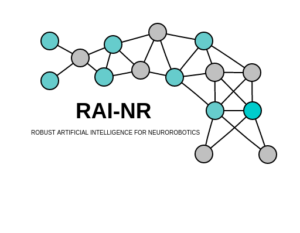RAI-NR
Bayes Centre (5th floor) and School of Informatics, University of Edinburgh (26 – 28 August 2019)
Watch the animation below for a summary of this meeting.
This meeting will explore issues of reliability, safety and resource efficiency – key requirements for robotics, which will correspondingly focus the workshop towards debate and discussion on the question of how emerging neural network and other neuromorphic technologies could address these requirements in realistic applications. Robotics brings stringent constraints on size, weight and power constraints (SWaP), which challenges the developers of these technologies in new ways. Equally, the fact that learning and adaptation might happen on a real physical platform implies a significantly greater emphasis on ensuring safety and rendering automated decisions verifiable and explainable.
The workshop will be held over a 3 day period, hosted by the Edinburgh Centre for Robotics at the University of Edinburgh. The format will be to have several themed sessions, each involving a few keynote speakers as well as contributed talks on that theme. There will also be sufficient time for discussions – formally as part of a panel, and informally in between talks in the pleasant surroundings of the Edinburgh city centre.
Workshop Topics
The workshop will address the following questions, with keynote speakers and contributed talks driving discussions:
- Robotics and Robot Learning: How are neural network based methods and neuromorphic design principles driving advances in robotics?
- Hardware for AI: How are new advances in neurally inspired computing and electronic sensing hardware enabling these advances?
- Safety, verification and explainability: How are we developing the new techniques required to ensure the safety of learning, perception and control in real world settings?
- Neuroscience for perception and action: how can perspectives on how animals/humans solve problems be used to drive advances in robotics?
Proceedings
Authors of workshop contributions will be invited to contribute to a special issue in Frontiers in Neurorobotics, alongside further solicited contributions within the Research Topic.
Registration
Registration is now closed.
Executive Organising Committee
- Dr Subramanian Ramamoorthy – University of Edinburgh
- Dr Joseph Hays – US Naval Research Laboratory
Organising Committee
- Dr Michael Burke – University of Edinburgh
- Dr Simón C. Smith – University of Edinburgh
-
Dr Wallace (Ed) Lawson – US Naval Research Laboratory
-
Dr Keith Sullivan – US Naval Research Laboratory
-
Dr Glen Henshaw – US Naval Research Laboratory
- Dr. Christian Tetzlaff – Bernstein Center for Computational Neuroscience Göttingen
Sponsors and supporters
This workshop will be funded primarily by the US Office of Naval Research through their Global office in London (ONRG), and also supported by an Alan Turing Institute sponsored project on Safety-critical Artificial Intelligence and Frontiers, who will be publishing a special issue on workshop topics.


